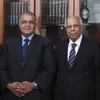Started from a village, grew into a Rs 6,000 Cr turnover business: the Made in India story of GR Infra
Looking to build roads to connect his village, GR Agarwal laid the foundation for GR Infraprojects in Rajasthan in 1965 when he started a small infrastructure development venture. Today, the family business is a well-known, Rs 6,028 crore revenue firm and has filed to go for an IPO.
In the 1960s, Gumani Ram Agarwal (GR Agarwal) lived in the desert-like, arid and semi-arid regions of Churu district in Rajasthan. There were no roads, and the grain merchant found it difficult to commute to neighbouring villages and towns for work.
With limited resources to feed his family, survival was hard.
GR Agarwal felt the government was not focused on constructing roads in such areas at the time. Not one to give up, he took up the task himself and started a business to build roads in the state in 1965.
Starting from scratch with an infrastructure project near Jaisalmer, his small partnership firm served as the foundation for GR Infraprojects – an integrated road engineering, procurement and construction (EPC) business with Rs 6,028 crore turnover in FY20. In recent years, it has forayed into railway projects as well.
In an exclusive interview with SMBStory, his son Vinod Kumar Agarwal, MD and promoter at the firm, says:
“Under difficult conditions in our village, our family had to fight for survival. My father challenged himself to make a difference and start an infrastructure company. Most of us (my brothers) did not receive proper education in the village, and one by one, we joined our father’s business. Over the years, our family business grew as the opportunities for road construction unfolded in the country.”
In 1995, the family business was incorporated as GR Agarwal Builders and Developers, and in 1996, acquired the founding father’s partnership firm. Later, in 2007, it was renamed GR Infraprojects and took up a fresh certificate of incorporation.
The road to Gurugram
With customers such as National Highway Authority of India (NHAI), Ministry of Road Transport and Highways (MoRTH) and some state governments, the 15,000-employee strong company’s growth has come on the back of five brothers taking up numerous types of infrastructural projects and placing focus on backward integration, strong execution, and financial discipline.
Vinod says, “Often, our projects were located hundreds of kilometres away. Ten years after starting the business, we moved to Jodhpur. Then, my brothers and I would each relocate to a different town with our families to execute projects. It became our nature to shift our homes and go wherever there was work.”
The brothers’ families lived in several towns across the region, found themselves together in Udaipur at a point, and eventually all settled in Gurugram.
Ajendra Kumar Agarwal, Executive Director and Promoter at GR Infra, was the first to settle in Gurugram.
He says:
“Our family moved to Jodhpur and I was lucky enough to study civil engineering in the city before joining GR Infra. Since joining the business and getting married, my family has shifted between at least 20 homes.”
The experience they gained while moving from place to place, and settling in a well-connected city like Gurugram allowed them to undertake backward-integrated projects such as developing roads and highways on an EPC or Build, Operate, Transfer (BOT) basis.

A rail overbridge built by GR Infra in Jodhpur
Backward integration and financial discipline
GR Infra also conducts industrial activities for processing bitumen for roads, manufacturing thermoplastic road-marking paint, electric poles and road signage, and fabricating and galvanising metal crash barriers.
“We always undertake business in an integrated manner as we have developed key competencies and resources in-house to deliver all such projects – right from conceptualisation until completion,” says Vinod, adding:
“Our in-house integrated model includes a design and engineering team, manufacturing facilities for bitumen across Udaipur, Sandila, and Guwahati; metal crash barrier and electric pole units in Ahmedabad; road-marking paint and signage units in Udaipur, and more. We also own construction equipment and a fleet of freight vehicles.”
These in-house capabilities reduce GR Infra’s dependence on third-party suppliers for key materials such as bitumen and other products required for the completion of roads. They have also helped focus on financial discipline by ensuring healthy cash flows, return on capital employed and margins, according to Vinod.
“Road construction is a crowded space with many players such as Dilip Buildcon, KNR Construction, Ashoka Buildcon, PNC InfraTech, and more. We stayed ahead in terms of completing projects on or before the scheduled completion date,” he says.
“This helped us earn marginally better through reward mechanisms such as early completion bonuses. In addition, strong cash flows lead to better negotiation for supplies, which helped us control costs better,” he adds.
Taking the company public
As the net worth of the bidding organisation is a key criterion for landing road projects, GR Infra looked to raise its net worth from 2010 onwards. In 2011, it sold a minority stake for Rs 80 crore to Motilal Oswal Private Equity Advisors (MOPEA), along with Hybrid Infrastructure Portfolio managed by IDFC Investment Advisors.
“Due to our strong financial discipline, we didn’t require working capital. We wanted to raise our net worth through the funding. We also had an exit understanding of around four to five years with the investors. We thought of achieving this by going for an IPO, but instead sold two BOT projects which gave us extra liquidity, allowing us to give an exit to IDFC,” Vinod says.
In 2018, GR Infra again thought of going public and giving an exit to Motilal Oswal, only to change its mind once more due to the IL&FS crisis and a weak market. “We told Motilal to sell its stake to another investor, but these deals did not materialise. So we planned to finally go ahead with the IPO in 2021,” Vinod says.
In April 2021, GR Infra filed a Draft Red Herring Prospectus (DRHP) with SEBI for its IPO.
Prakash Bagla, Principal, Motilal Oswal, says:
“Right from inception, GR Infra was built on company profits. There was never a need for working capital. IDFC and us invested in it just to raise its net worth. This is not common in the infrastructure sector. Through the IPO, we are selling 100 percent of our ten percent stake in the company.”

Vinod Kumar Agarwal, MD and Promoter, GR Infra
COVID-19 impact and future plans
The IPO plans come at a time when the second wave of the COVID-19 pandemic has swept the country, bringing several sectors to a standstill.
However, the Indian construction industry is expected to register a 13 percent growth in 2021 on the back of increased government spending on infrastructure development.
GR Infra is currently running at about 60 to 70 percent capacity across its projects, and expects its FY21 revenues to be better than its FY20 numbers, according to Vinod.
Ajendra adds that GR Infra has been remotely tracking progress and overseeing teams working at its project sites.
He says, “During the first wave, labourers went home and did not return quickly. This time, they were more prepared to stick on and make use of the medical care facilities we provided on the sites of our projects.”
Vinod adds, “In this second wave, there aren’t as many government restrictions on infrastructure development activities. Further, the virus has infiltrated villages. Thus, many migrant workers do not find it beneficial to go back home and would rather stay and work. So we set up COVID-19 care sites and provided facilities for oxygen and medicines at each of our sites.”
While the brothers did not talk about GR Infra’s future plans as the company has been largely quiet since its DRHP was filed, they remain optimistic about the family business’ growth across its top-line and bottom-line.
“We have an orderbook size of Rs 19,000 crore, and we will continue to focus on road construction and new railway projects, and find some new sectors as well,” Vinod says.
Edited by Kanishk Singh









